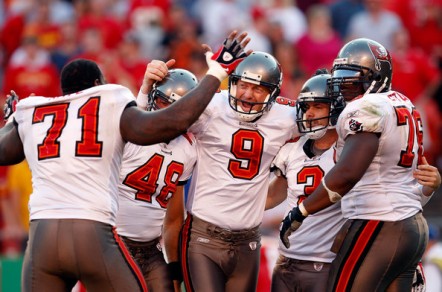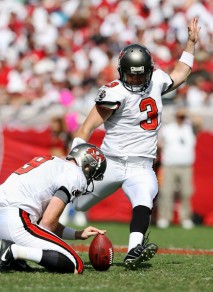Special teams are often overlooked in football, until it comes down to a last-second kick to decide the game. Punters feel equal pressure, one of the key components in the chess match of football, tasked with pinning the opponents deep in their own territory. Armed with toes of steel and spin on the ball that makes golfers envious when the flop-wedge punt results in downing the ball at the 1, a great punter can mean as much to a victory as a key starter on either side of the ball. Punters get the unenviable task of being a relative unknown on a team, unless they do something spectacular, or screw up.
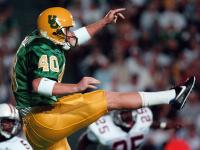 One of the greatest punters in Oregon football history, known for doing the spectacular booming kicks deep and pinning opponents inside the 10, made a big difference in his time at Oregon helping lead the Ducks to the success of the late 90s–Josh Bidwell.
One of the greatest punters in Oregon football history, known for doing the spectacular booming kicks deep and pinning opponents inside the 10, made a big difference in his time at Oregon helping lead the Ducks to the success of the late 90s–Josh Bidwell.
In the 1995 season opener, Oregon’s all-purpose kicker/punter Matt Belden suffered a career-ending injury. The Ducks faced a major dilemma, relying on Belden to cover both kicking duties, coaches needed a replacement fast knowing they had no one with any game experience. Coming to the rescue was Josh Bidwell, a high school quarterback who took over all kicking duties for the remainder of the game. Oregon soon found a replacement full-time placekicker in Joshua Smith, but Bidwell from that point would never relinquish the punter’s role, going on to make every punt for Oregon until his final game as a Duck.
Becoming one the best punters in the country, Bidwell was selected in the 4th round of the 1999 draft by the Green Bay Packers, beginning a 12-year NFL career that included a Pro Bowl selection in 2005. Now retired from the NFL, a cancer survivor, and published author; FishDuck had the pleasure of catching up with Josh to relive his Oregon glory days.
We will follow-up with another interview with Josh soon to discuss his foray into writing, his time in the NFL, and his bout with cancer.
Q. Tell us about your early days as a punter?
I had always been able to kick, so by the time high school rolled around, I was all-league my freshman and sophomore year, and all-state my senior year. It was just one of those things that I was blessed with, and was good at all the time, though I was also the starting QB in high school. I figured it out, honed that skill, and got noticed enough to be given a scholarship at the U of O.
Q. What schools were recruiting you, and what made you decide to be a Duck?
Oregon was the one and only Division I-A school that offered me a scholarship. I had gotten smaller school looks (not all scholarship offers) from local schools such as Willamette and Linfield. Those types of schools wanted me to come in, kick, and possibly play quarterback, but it never got to that point. Coach Brooks was impressed enough with me as a punter and an athlete, so he offered me a scholarship right then and there. So, it happened pretty quickly.
[Note: Bidwell attended Douglas High School of Winston, Oregon (also alma-mater of USC legend Troy Polamalu (graduating several years prior to Polamalu’s arrival.) Bidwell was primarily a high school quarterback, but proved to be a versatile all-purpose athlete who also saw playing time on defense and special teams; frequently handling kicking duties.]
Q. Given you were a high school quarterback, how was becoming a punter full-time different from your expectations? How did you adjust to the position change and college transition?
That was tough. Even my first year of college, I was playing on the scout team. Playing several different positions and having a lot of fun being athletic was what I wanted. But when Matt (Belden) went down and I had to go in and punt that year, then all of a sudden Coach Bellotti comes up and says ‘you can’t run routes, and we can’t have you on the scout team playing any tackling positions, because if you get hurt we don’t have anybody left.’ That first year (1995) was a bit of a struggle; I didn’t punt well at all, and quite honestly had terrible stats. But, I worked really hard the next summer.
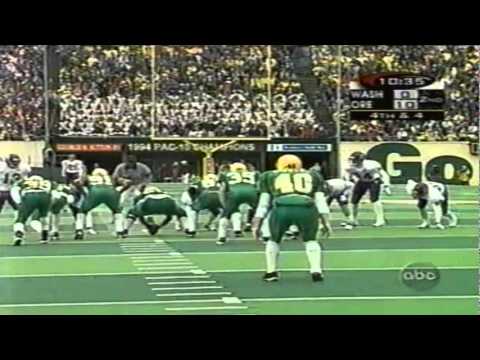 When we came back for fall camp, they were fully prepared to have a big competition for the starting special-teams spots, but I had improved so much over the summer, it was obvious by the first day that it was going to be my job. We just kind of went on from there. At that point, I was punting well. I just worked hard at it and got better and decided that my boredom during practice and my pride of not being an ‘athlete’ certainly shouldn’t supersede an opportunity to succeed and earn the scholarship I was given. At that point, I decided to buckle down, work hard, and get better.
When we came back for fall camp, they were fully prepared to have a big competition for the starting special-teams spots, but I had improved so much over the summer, it was obvious by the first day that it was going to be my job. We just kind of went on from there. At that point, I was punting well. I just worked hard at it and got better and decided that my boredom during practice and my pride of not being an ‘athlete’ certainly shouldn’t supersede an opportunity to succeed and earn the scholarship I was given. At that point, I decided to buckle down, work hard, and get better.
Q. Was there a key point to your turnaround?
My first year on the field was a struggle, and I knew I needed to improve. My grandfather had a business partner in San Diego. His business partner happened to know Darren Bennett, who was the All-Pro Punter for the San Diego Chargers. His partner went to Bennett and said ‘my buddy’s grandson is the punter at the University of Oregon, would you mind spending some time with him?’ He agreed. They arranged just one week, so I went out and punted three days with Darren at the Chargers’ facility. I learned a lot and saw a lot, but I remember how two things crossed my mind:
1. I realized how big this guy was…He was a former Australian Rules Football player, so he was probably two inches taller than I was, at 6’6″ and probably 40 pounds heavier than I was! So, that had me thinking, ‘This guy just kicks it a mile!‘ I was just a kid, so I didn’t realize I had so much more room for improvement.
2. I really did pick up some techniques from him, mostly from things I watched him do. He didn’t necessarily coach much, he just kind of showed me things he did, and I just picked it up from those things by watching him. He didn’t necessarily talk about it, it just ended up working well for me to assimilate into my game and it made a huge difference. So, I went back to Oregon right after that, punted all summer long, and heading into the 1996 season I had improved so much I went on to have a seven-yard better average than the previous year.
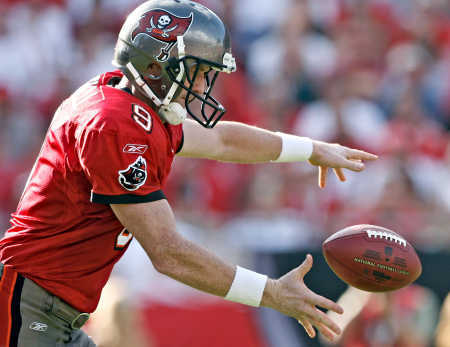 Down the road, the neat thing is, I remember actually getting a chance to play against Darren when I was in the pros. When I was with Green Bay, we went down and played San Diego; and the guy was the classiest guy I had ever met. In fact, he missed a Wednesday practice because his wife was having a baby. We were supposed to meet on Wednesday to practice together, but he called me from the delivery room to apologize. Instead of punting that day, we made the arrangement to punt on Thursday and Friday because he wanted to give me enough days. That always stuck with me, just him being a class person and man of his word. I hadn’t even talked to him in about four years since he helped me when I was in college. Then when I was drafted, he approached me, and we just picked up where we left off. He remembered my grandfather, my grandfather’s business partner, our time together, and said how he paid close attention to my collegiate career. It was neat to turn into an All-American/Pro and have him be a part of that.
Down the road, the neat thing is, I remember actually getting a chance to play against Darren when I was in the pros. When I was with Green Bay, we went down and played San Diego; and the guy was the classiest guy I had ever met. In fact, he missed a Wednesday practice because his wife was having a baby. We were supposed to meet on Wednesday to practice together, but he called me from the delivery room to apologize. Instead of punting that day, we made the arrangement to punt on Thursday and Friday because he wanted to give me enough days. That always stuck with me, just him being a class person and man of his word. I hadn’t even talked to him in about four years since he helped me when I was in college. Then when I was drafted, he approached me, and we just picked up where we left off. He remembered my grandfather, my grandfather’s business partner, our time together, and said how he paid close attention to my collegiate career. It was neat to turn into an All-American/Pro and have him be a part of that.
Note: Each year, Bidwell progressed more and more with hard work and persistence, upping his averages to amazing numbers. By his senior year, Bidwell averaged nearly 50 yards/punt and totaled 2,346 yards. Only one punt was blocked in his entire career, a result of backups protecting him late in the game during “mop-up duties” after Oregon had secured the victory.
Q. What was it that led you to going from a very inconsistent freshman campaign to becoming one of the best punters in Oregon history?
Being consistent, mainly. Other than hard work and persistence, there’s no real secret other than just confidence. Once you figure it out, the big thing is finding your comfort level so that you know you’re going to do it more times than not. That was the issue with me – every year I got stronger, but there are tons of kids out there stronger than the guys who actually have jobs in the NFL. They simply cannot mentally recreate that under pressure. For me, punting just got easier to the point where (though sure I felt pressure out there) your repetitions and instincts just take over once the ball is snapped.
It happens SO quickly, once the ball is snapped. From the snap to the time I catch and kick it, it’s 1.3 seconds, and that’s a quick play. Anything slower than that is going to have a chance at being blocked. So, you really have to have some competitive muscle memory to just catch it, kick it, get it going, and do your job. It took time to adjust, but once I did, I got more and more confident. I knew I was getting stronger, I knew I had plenty of strength; but getting consistent is what gets you to the National Football League and keeps you there. If you get a 90 yard punt, followed by two 12-yard punts, that doesn’t matter at all. They’d rather someone who gets a 38-42 yard punt every time.
Q. Who was your most influential coach, and what they did to improve your skills?
Coach (Jim) Radcliffe was huge. Everyone knows him, he trains olympians, NFL/NBA stars, and now Major League stars. Coach Rad did a lot for us kickers, and was actually assigned to all of us kickers and punters during practice. We had a standard warm-up routine where we did a lot of mobility stuff and a lot of lower back/core work. A lot of times, I didn’t even realize the value of that work, and didn’t understand just how valuable it was until I left for the NFL.
With Coach Radcliffe, I didn’t realize just how much explosive training I was getting. With basic weightlifting, it’s easy enough to see the results; but all the warmup stuff we did that almost seemed tedious to do day-in and day-out turned out to be strengthening and durability exercises that were invaluable for my career. As far as technique, he didn’t pay much attention to that aspect. Some coaches feel like they are just in to coach, even if they don’t know a thing about punting or anything; but they feel like they can just make something up. We can see through that, it’s non-productive, when you have to play along and at worst just keep doing what you’re doing when they take all the credit. ‘Feeding the machine’ is something I didn’t have to worry about with Coach Rad, as he stayed away from that.
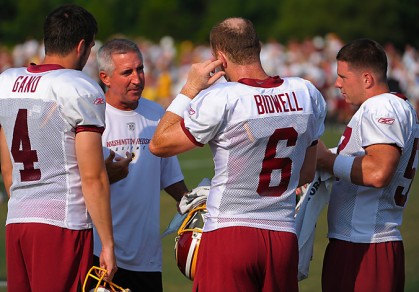 Coach (Mike) Bellotti turned into my punting coach. For whatever reason, he just loved it. He never went out and kicked or anything, but he took a great amount of interest in it. He would actually stand next to me during the entire punting sequence of practice, and he would talk to me about it. I’d hit them all, and he’d ask me what I did right, and frequently watch film with me. So, in the course of working with me, he figured out what led to my best punts. That made it pretty easy for him to identify on film what looked a little different.
Coach (Mike) Bellotti turned into my punting coach. For whatever reason, he just loved it. He never went out and kicked or anything, but he took a great amount of interest in it. He would actually stand next to me during the entire punting sequence of practice, and he would talk to me about it. I’d hit them all, and he’d ask me what I did right, and frequently watch film with me. So, in the course of working with me, he figured out what led to my best punts. That made it pretty easy for him to identify on film what looked a little different.
With Bellotti, it wasn’t as much coaching as it was asking questions and talking through it, mainly because I’m more of a feel/hands-on kind of guy than I am someone who likes to watch a lot of film on my techniques. If you start focusing on techniques too much, it takes away from actual natural motion. I’d get to the point where he and I could identify things together, and it was nice to have someone there to reinforce what I already knew. So I would self-coach, but at the same time–if the ball turned or dropped, I knew it as well as he did. But, being able to talk about it at that moment in practice helps you realize that the coach is on your side wanting to help you do better. It’s a big difference when you’re out there trying not to make a mistake to avoid being coached. That’s what I appreciated most about Coach Bellotti, and I think that’s a big reason I had much of the success that I did, because he helped me get to a comfort level where they knew my desire was to succeed and do my best, and I was going to make the sacrifices in my personal and professional life to get to that point.
All I wanted was support and a little help along the way; and they figured it out. It was a blessing to have all of those guys in my corner working with me. If I didn’t have that, I wouldn’t have been as good; and the same if I’d been overcoached. They found a very good balance.
Q. So if coaches Radcliffe and Bellotti were so instrumental in helping you to improve, what about Special teams Coach Tom Osborne?
Coach Osborne’s role was different on a one-on-one level than Coach Rad and Coach Bellotti. Coach Oz I give a great amount of credit to for my success. At one point in the off-season, he had just come back from some NFL camps where he would go to study. Upon returning, he had learned about their punters’ directional punt. He asked me what I thought about it, and of course I do whatever the coaches say, so I just said ‘let’s work on that.‘
So, that entire off-season in the spring, I just worked hard on getting the ball to the left and right, and trying to get a normal punt off. It was difficult, but it helped me that it was as difficult it was. It got to a real comfort level for me, where I could just go bombs away.
Certainly it wasn’t the easiest thing to do, given you have to crank it and kick it accurately and soundly down the field, but by the time I got to my senior year I was real comfortable with it. The reason I was able to get drafted in the fourth round was because I had proven for two years that I could punt the ball in an NFL-style system–not just with power, distance, and height; but with direction, being an effective participant in the outcome of the game.
Q. Are there any moments that stand out where you specifically used the directional punting technique?
That led to a lot of key punts for us my last couple years at Oregon. There was a punt at UTEP that was the longest I’d hit in my life, which turned into a turnover. I remember a couple against Washington late in the game, that ended up being great punts that went out of bounds or right on the sidelines inside the five. Those may not have happened had I not learned directional punting. Pinning the guy to the sidelines adds a lot of pressure; and I wouldn’t have known that had I not learned the technique from Coach Oz.
I would have just snapped it, caught it, and kicked it without Coach Oz pointing that out to me; and I certainly wouldn’t have gotten drafted as early as I did had I not been one of those guys. I don’t think I would have had the success in the NFL trying to learn that stuff there. That is very difficult to do under the pressures of the NFL, so I’m glad I was able to learn it for two years in college and put it to work.
[TRIVIA: What other position did Josh Bidwell play for the Ducks aside from punter?
Answer: Holder. Following the departure of backup QB/four year special teams holder Ryan Perry-Smith, Bidwell assumed the holding duties in 1997. In 1998, newcomer Nathan Villegas was perfect on PAT attempts, and a near-perfect 20-22 on field goals; thanks largely to Bidwell’s perfect holds.]
Q. You pulled double-duty as both a punter and holder on kicks, what is it like having a kicker swing his leg inches from your hands?
I hated it! But, someone had to do it… (Ryan) Perry-Smith graduated, and we didn’t have a holder. I had two years left, while (prospective holder) Jason Maas was set to rotate with Akili Smith as starting quarterback and they didn’t want him being distracted by the holding position. I was good at holding, so it wasn’t a big issue for me. Even though I hadn’t done it in a game yet, I think they just felt comfortable with me.
For me, I did it great in practice, it came natural, and I knew what I was doing. It’s certainly not the easiest thing to do, though it looks simple, but I’ve seen stellar athletes from receivers to hall-of-fame quarterbacks who had no chance to hold. Getting the coordination down to get the ball snapped and down in less than a second is difficult. It just came natural, and I had the advantage of being with the kickers in practice and not having to go learn offensive plays, so I was able to get extra holds in and get into a comfortable timing.
During my junior and senior year, I was the holder. You’re only seven yards away, it’s coming back at you; and having the ball down in less than 1.3 seconds (so the guy can kick it) is terror! Factor in a game-winner, it’s unreal.
My senior year, we were up at Oregon State in a torrential downpour. We needed the PAT to tie, or the game was over. I knew if I didn’t catch this really slippery ball, put it down, and get it where Villegas could hit it – we’d lose the game. Catching a wet ball is hard, and while wide receivers get excused all the time–I’m not supposed to drop the ball. I caught it, put it down, and he nailed it; and I remember thinking ‘O THANK YOU, LORD!’ Though we eventually lost, at least it wasn’t as silly as the punter/holder dropping the ball.
Other than that, it’s not a fun job. Though it came natural, I would have just said ‘oh, just let someone else do it‘ had I been given the option.
Q. Are there any extra memorable plays from your career that stand out?
I remember how I had a fake punt pass, my first and only pass in college, down at USC. It was AJ Jelks in the flat. I tossed it a little bit high, but threw a great ball and he made a good catch for the first down. That was a lot of fun.
[Note: In 1997, Oregon was trailing USC 21-3. A huge turning point in the game came when Bidwell called on his old high school QB abilities to fake the punt and throw a first down; swinging the momentum in Oregon’s favor to begin a comeback. Oregon nearly pulled off the comeback victory, but came just short at the end as the winning field goal barely failed. (However, the comeback gave them the confidence and momentum to finish the season strong.)]
My UTEP punt was 5.5 seconds, 60 yards, and pinned onto the right sideline exactly where it was supposed to be. At that point, it was the best punt of my career. In fact it was so high and coming down so fast, the guy dropped it and we were able to recover it. That was essentially a 60-yard bomb and a recovery for us –a key play for our success in that game. That definitely sticks out in my mind, one of my favorite college plays.
I also remember how we had a home game against Washington my senior year. It was tight, late in the game, and we had to make one more punt. We didn’t want to have a touchback and give them field position, we wanted to have it inside the 20 if we could.
Wanting to pin them down, I was able to hit a punt to the left, and it landed on the five and just went straight out of bounds, which pretty much sealed the deal. If they’d have had it at the 15 or the 20, they still would’ve had a little momentum and a little buzz on their team. I felt when I did that, it completely deflated them. I thought it was a big play, but didn’t realize until the coaching staff came up and basically tackled me on the sidelines how important it was!
Q. What is your favorite game from your career? What do you remember best about it?
Definitely the 1994 Washington game. I didn’t even play in it because I was a redshirt, but that Washington game where Kenny Wheaton had “The Pick” stands out. That was an amazing game and moment, but that opened my eyes to the fact that Oregon was a lot more special than I thought it was going to be. We were mediocre at best when I was heading in there, but that kind of set the stage for where we are now. I remember at that point just thinking ‘this is going to be a little more fun than I thought!‘
[Note: As any self-respecting Duck fan can account verbatim, Kenny Wheaton’s 97 yard interception return against Washington sealed the victory for Oregon; and they would go on to win out the remainder of the regular season to earn their first Rose Bowl trip in 37 years. Bidwell was a true freshman in his redshirt season at the time, but was a valuable player on the scout team and sidelines helping out in the unforgettable “Gang Green” era.]
Q. What is your favorite memory of your time at Oregon?
The thing that sticks out the most is how much fun it was. I certainly went to school and had serious academics I wanted to do well at, and I knew that would be vital to my success in life. But, looking back, I never traded away my long-term goals for any type of immediate pleasure. I worked hard, but I had a lot of fun too.
I never did anything silly or stupid that was going to put my career or my future in jeopardy; and I just worked really hard at it. I have a lot of memories of being well respected by the coaches and my teammates; and I think for me, the spiritual growth I had throughout my college days were the foundation for the man I feel I am now.
Q. What do you think is your legacy left behind at the University of Oregon?
First, the fact that I was able to play well enough to be regarded as the best punter to come through there. I think right now, Jackson (Rice) is challenging that; and over the long term, I think he’s a better punter than I was in college. That’s neat, because you want the new players after the fact to succeed; and Jackson is a great kid, I’ve really enjoyed getting to know him and am excited for his opportunity for the pros after next season. But, to be told by so many that they regard me as the best punter to come through there means a lot.
Also, I was somebody who people could count on, even the coaches called on me to help mentor struggling players and teammates, which not a lot of coaches elsewhere would do. It meant a lot to me, because it was something that was my passion. Football only lasts for so long; but the spiritual lessons learned last for an eternity and I wanted to be a part of helping people come to that type of security and comfort level, and that’s what I most value.
[Note: Since Bidwell’s departure following the 1998 season, no punter has started every game from freshman to senior year and progressed statistically as well as Bidwell.]
Josh Bidwell was a legend at Oregon, and has had quite the colorful life following his departure at Oregon. After a very successful NFL career of 12 seasons, he and his wife Bethany currently reside in Eugene with three children–Brady, Aaron, and Grace; where he works at a mortgage brokerage firm. To add to his busy life, in 2006 Bidwell founded the Josh Bidwell Foundation, which raises money for the less fortunate and engages communities to reach out.
Following a difficult battle with cancer, Josh Bidwell wrote the book “When It’s Fourth And Long” about his football experiences, surviving cancer, and other inspiring moments of overcoming adversity from his life. 100% sales of the book benefit the Josh Bidwell Foundation, Josh’s way of giving back to the community that did so much for him.
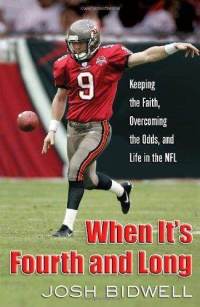 [Note: FishDuck looks forward to featuring Bidwell again; focusing on Bidwell’s post-Oregon days in a successful and lengthy NFL career, the health struggles he overcame, his family and spiritual life, and his current career now that he has hung up the cleats.]
[Note: FishDuck looks forward to featuring Bidwell again; focusing on Bidwell’s post-Oregon days in a successful and lengthy NFL career, the health struggles he overcame, his family and spiritual life, and his current career now that he has hung up the cleats.]
TO BE CONTINUED.
These are articles where the writer left and for some reason did not want his/her name on it any longer or went sideways of our rules–so we assigned it to “staff.” We are grateful to all the writers who contributed to the site through these articles.

